Editor’s note: This is the third in a series of articles based on a July 2022 statewide poll conducted by South Dakota News Watch and the Chiesman Center for Democracy at the University of South Dakota, and is the latest segment in the ongoing “South Dakota Matters” series of polls and panel discussions hosted by News Watch.
While the governor and Republican-led Legislature push to expand access to firearms in South Dakota, a majority of voters favors restrictions such as waiting periods and age limits for some gun purchases, according to a statewide poll co-sponsored by South Dakota News Watch.
The poll of 500 registered voters showed that 60% of respondents support establishing a two-week waiting period to buy an AR-15 – a semi-automatic rifle originally designed for military use – and 54% support a minimum age of 21 for AR-15 purchases. There is less agreement on gun sales in general, with 41% saying South Dakota’s laws should be stricter and 47% saying that they should stay the same. Only 11% responded that laws governing gun sales in the state should make firearms easier to acquire.
The random telephone survey was conducted July 19-22, 2022, by Mason-Dixon Polling & Strategy and was co-sponsored by News Watch and the Chiesman Center for Democracy at the University of South Dakota. The poll is part of the ongoing “South Dakota Matters” series of polls and panel discussions hosted by News Watch; the margin of error is plus or minus 4.5%.
Advocates of stiffer gun regulations have focused on the AR-15 because it has been used in several high-profile mass shootings, including the May 24, 2022 tragedy at an elementary school in Uvalde, Texas, where a gunman shot and killed 19 children and two teachers before being killed by law enforcement officers, who were heavily criticized for their delayed response.
“We’ve had a series of mass shootings, and I think they’re still on people’s minds,” said Michael Card, an emeritus professor of political science at USD. “Especially when they involve children and other vulnerable people. That is more likely to send us as a society to think that maybe this is something we need to control a little bit more.”
Card added that the much-scrutinized law enforcement response in Uvalde – which led to the firing of the school district police chief on Aug. 25 – “cast doubt on the (National Rifle Association) maxim that the only way to fight a bad guy with a gun is with a good guy with a gun. There were lots of good guys with guns who didn’t do anything that day.”
Emily Thomas, South Dakota chapter representative for Moms Demand Action, a national gun safety organization, volunteered with the group following a 2015 shooting incident at Harrisburg High School, where a 16-year-old student shot the principal in the arm with a handgun before being tackled and restrained. Thomas’ son was a student at the school at the time.
“That was the worst day of my life, not knowing if my son was alive,” she said. “You become a little numb, but then I realized that we can’t become numb. So many people have done that, thinking that dealing with gun violence and school shootings is just how it is, but this is not the way that any of us want to live. No one is pro-gun violence.”
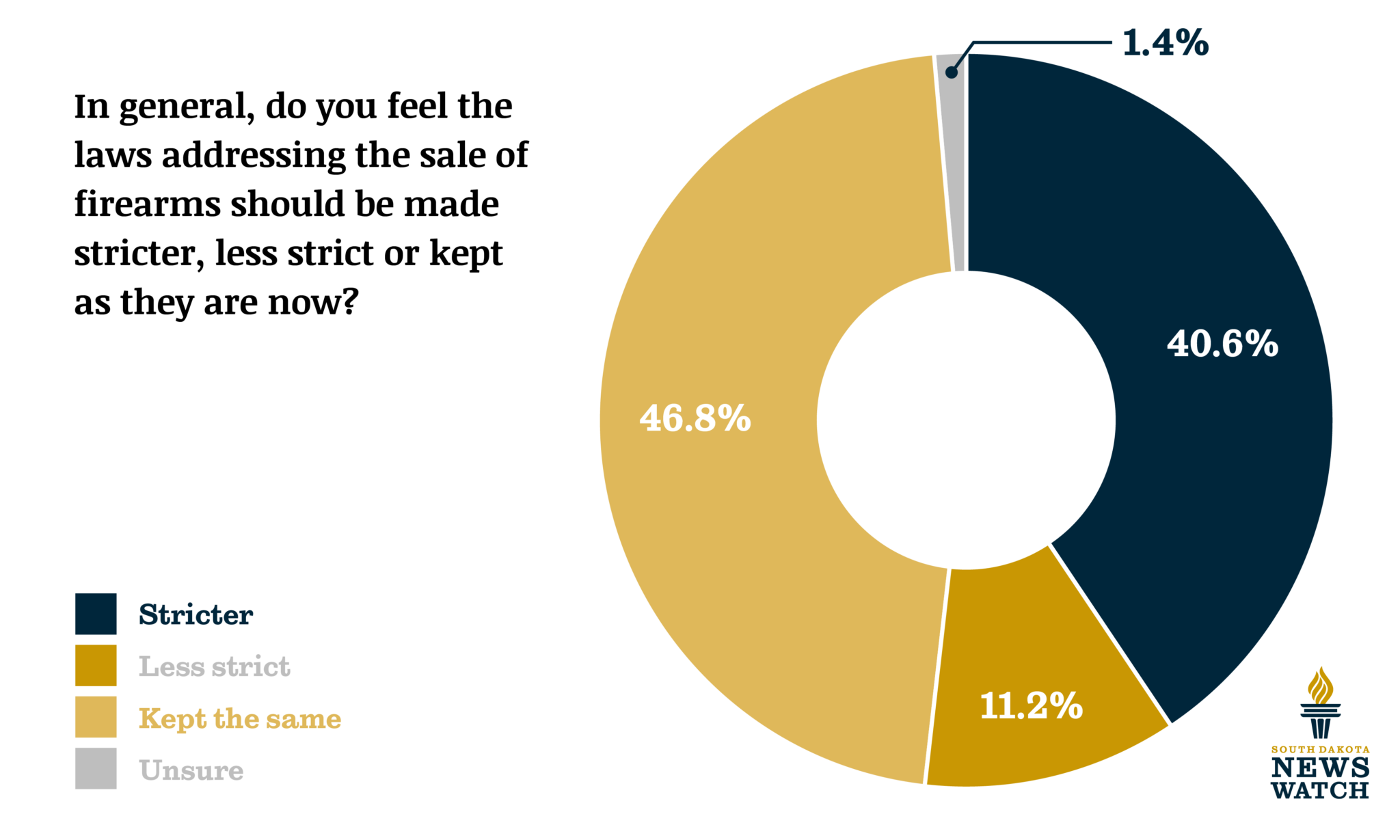
The News Watch poll revealed a partisan divide, with Republicans more likely to be satisfied with the status quo. Of Democrats surveyed, more than three-fourths (76%) said laws surrounding firearms sales should be stricter, compared with 14% of Republicans. Most Republicans (67%) favored keeping the laws as they are, with only 18% saying gun laws should be less restrictive.
Of the Independent voters polled, a majority (55%) said gun sales laws should be stricter, while 40% wanted them to stay as they are and just 6% wanted to make them less strict.
Card said the poll results could reflect a reaction to legislation supported by Gov. Kristi Noem in recent years to make guns easier to purchase and carry in South Dakota. But he also acknowledged that conversations about gun control are different in some U.S. urban areas than in South Dakota, where sport hunting is part of the culture. An estimated 55% of South Dakota adults have guns in their homes, a percentage that ranks ninth highest among all states, according to the Pew Research Center.
U.S. Sen. John Thune, R-South Dakota, noted in June that the AR-15 – dubbed “America’s rifle” by the NRA for its modify-friendly design and minor recoil – is used by South Dakotans for shooting prairie dogs, a statement that drew ridicule in some circles while ringing true in others.
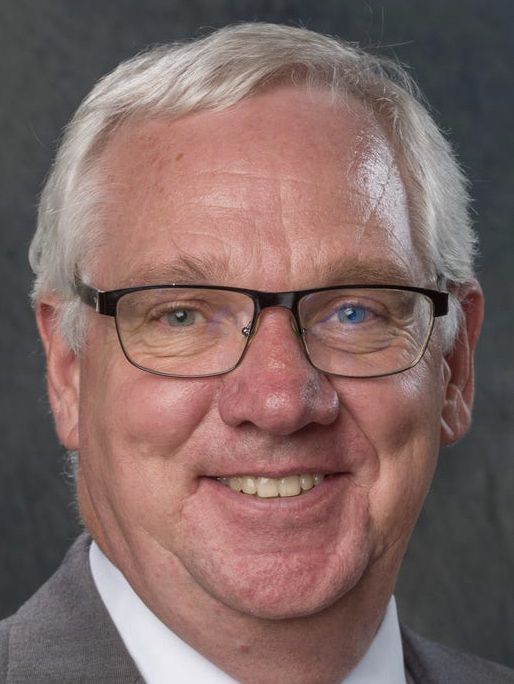
Card, who grew up in Timber Lake “with a shotgun and .22 rifle behind the seat of my pickup,” also spent five years in Ohio’s largest city, Columbus, where his neighbor was an emergency room doctor.
“She told me that if a shooting victim came in, they usually still had a gun on them,” he recalled. “It was a completely different world than rural South Dakota, where guns are typically used on varmints or for hunting. Growing up here, it was very clear that if you point your gun at something, you intend to kill it. That leads to a certain amount of respect for firearms.”
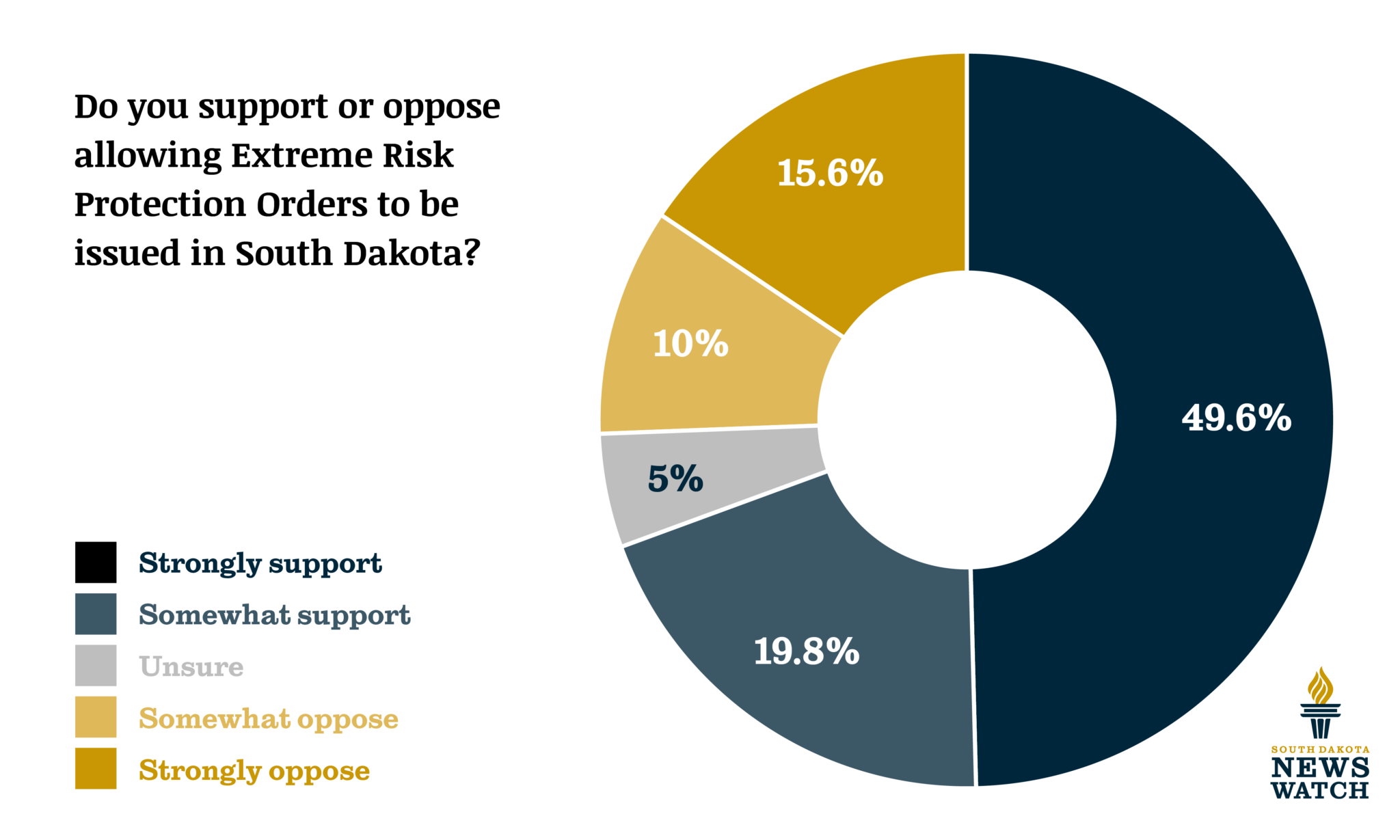
Noem, legislators make gun laws less stringent
South Dakota gun laws have become more lenient under Noem, whose Hamlin County ranch roots and support for Second Amendment rights are central to her political profile. Just weeks into her term in 2019, the governor signed a law that allowed people who can legally possess a firearm to carry concealed handguns without a concealed carry permit. That action was praised by the NRA but came despite concerns from law enforcement agencies such as the South Dakota Sheriff’s Association and South Dakota State’s Attorneys Association.
During the 2022 session in Pierre, Noem signed bills to eliminate fees for concealed carry permits (for use in other states or to expedite background checks) and to clarify the state’s “stand your ground” firearms law, providing greater burden-of-proof protections for those who use deadly force and claim self-defense.
Those actions helped elevate South Dakota from 29th in 2020 to 7th in 2022 on a ranking of “best states for gun owners” published by “Guns and Ammo Magazine,” which also praised the state’s “permissive NFA (National Firearms Act) environment.”
From the other perspective, Everytown for Gun Safety, a nonprofit advocating for gun restrictions and against gun violence, ranks South Dakota 46th on its list of states with safe and effective gun policies, placing the Mount Rushmore State in its “national failures” category.
Noem, seeking re-election this November, continued to trumpet her support for gun rights in the wake of the Uvalde tragedy, opting to speak at an NRA convention in Dallas just days after the mass shooting and calling South Dakota a “sanctuary” for the Second Amendment.
State Rep. Aaron Aylward, R-Harrisburg, said that renewed calls to regulate gun sales following high-profile shooting incidents are primarily a result of political posturing.

“Just look at Chicago, where shootings are a daily occurrence – do we hear about every one that happens?” said Aylward, 36, a former Libertarian candidate who changed his party affiliation to Republican and won office in 2020. “A lot of this is just the media or whoever is trying to get a story out and use certain situations to their advantage.”
Aylward sponsored a bill last session to allow state agencies to refuse to cooperate with federal gun regulations that would create a “chilling effect” on the local gun industry. Noem’s office didn’t offer support for the measure, which failed in the House after multiple amendments.
In the News Watch poll, women (61%) and people over 65 (61%) were significantly more likely to support banning the sale of AR-15s to people under 21. Federal law places the minimum age to purchase rifles or shotguns at 18, but state or local ordinances can raise that minimum age.
Six of the nine deadliest mass shootings in the United States since 2018 were carried out by men 21 years old or younger, according to the Violence Project, which maintains a national database of mass shootings. Many of those shootings involved semi-automatic rifles.
Of the respondents polled in South Dakota, 76% percent of Democratic voters strongly support raising the age limit to 21, while 41% percent of Republicans strongly oppose such a change. Of Independents, 53% strongly support raising the age limit.
When presented with these results, Aylward countered by pointing out that Americans are allowed to join the military as young as 17 years old.
“It’s OK to sign up these men and women to go fight in these foreign lands at 17 or 18 and use those weapons, but they can’t obtain an AR-15 here at home?” he said. “I have a problem with that. Regardless of what city or state you’re in, what it really comes down to is proper training and teaching people how to safely handle and use firearms. In the end, I will always be against laws that restrict someone’s right to defend themselves and their property.”
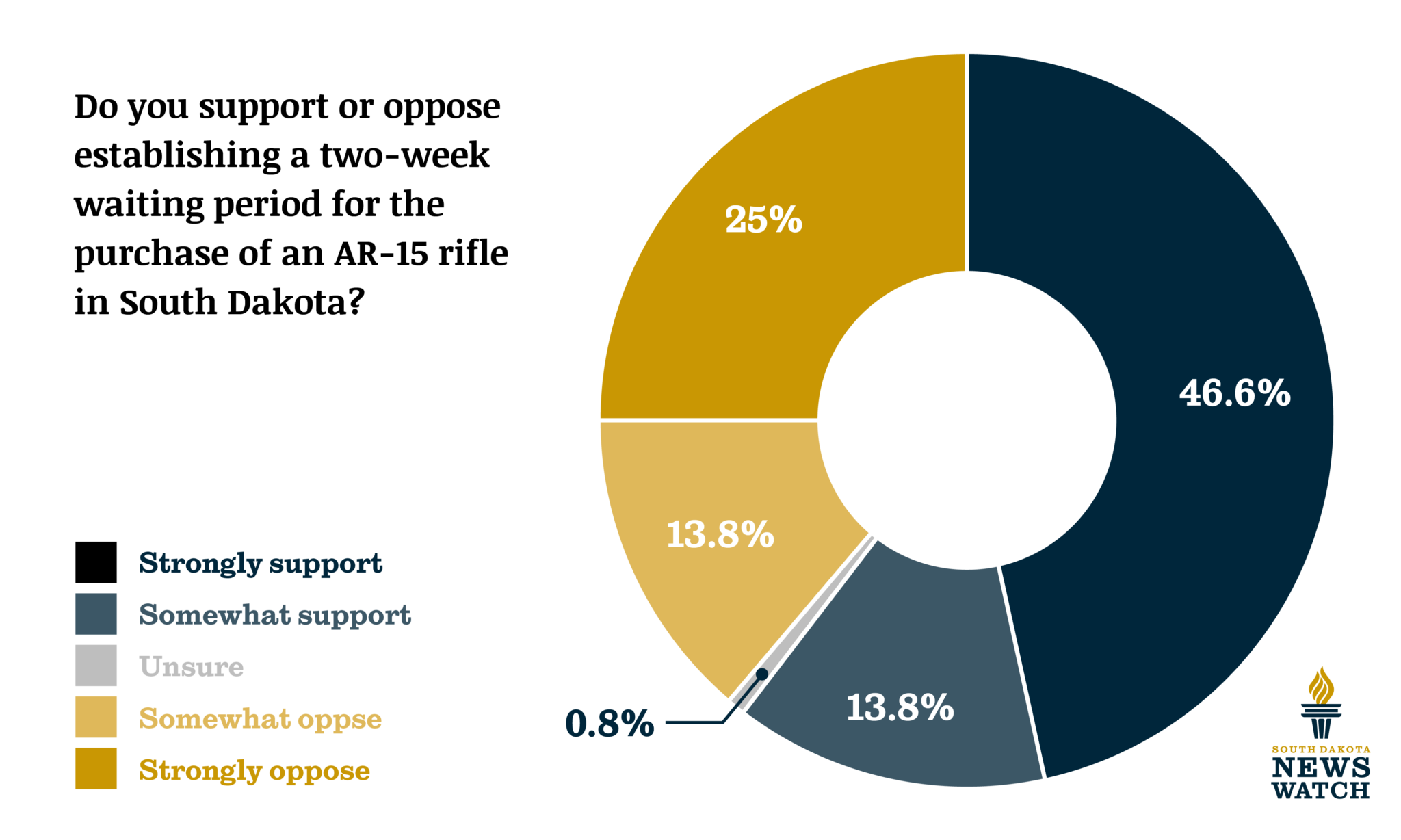
South Dakotans support extreme risk protection orders
In late June 2022, President Joe Biden signed a bipartisan law to expand background checks for gun buyers under 21 and devote more federal money to mental health programs and drug courts. The law also provided funds to help states establish “red flag” laws, which allow family members or law enforcement to petition a court to temporarily separate an individual from their firearm if they can prove the person is at risk of committing violence, including suicide. But Congress stopped short of adopting a federal framework for red flag systems, also known as extreme risk protection orders.
Supporters of stronger gun regulation criticized Congress for not going far enough, and the News Watch poll showed that a majority of respondents agreed. When asked whether they support or oppose extreme risk protection orders being issued in South Dakota, nearly seven in 10 (69%) said they would support such action, compared with 26% who would oppose. Nearly half of those polled (49.6%) said they would strongly support allowing extreme risk protection orders to be issued in the state.
Thomas said part of the challenge is to clear up misconceptions about how protection orders are carried out. “It’s not like Moms Demand Action volunteers would be knocking on doors and taking people’s guns away,” she said. “It’s family members and friends who are scared for themselves and others who then call law enforcement to save the person in crisis or themselves. It’s a temporary hold until the person gets back on track.”
Card drew a parallel between red flag laws and two-week waiting periods to purchase an AR-15, designed in part to allow for a “cooling off” period if someone is contemplating violence. The News Watch poll showed that 72% of females support the waiting period, compared with 47% of males, and respondents 65 and older were also more likely to support the regulation.
“It doesn’t surprise me that those groups (seniors and women) are more likely to favor limiting the sale of firearms, because they’re probably the people who feel most vulnerable to guns,” Card said. “In general, there are very few murders committed by a stranger in South Dakota. Most amount to domestic violence.”
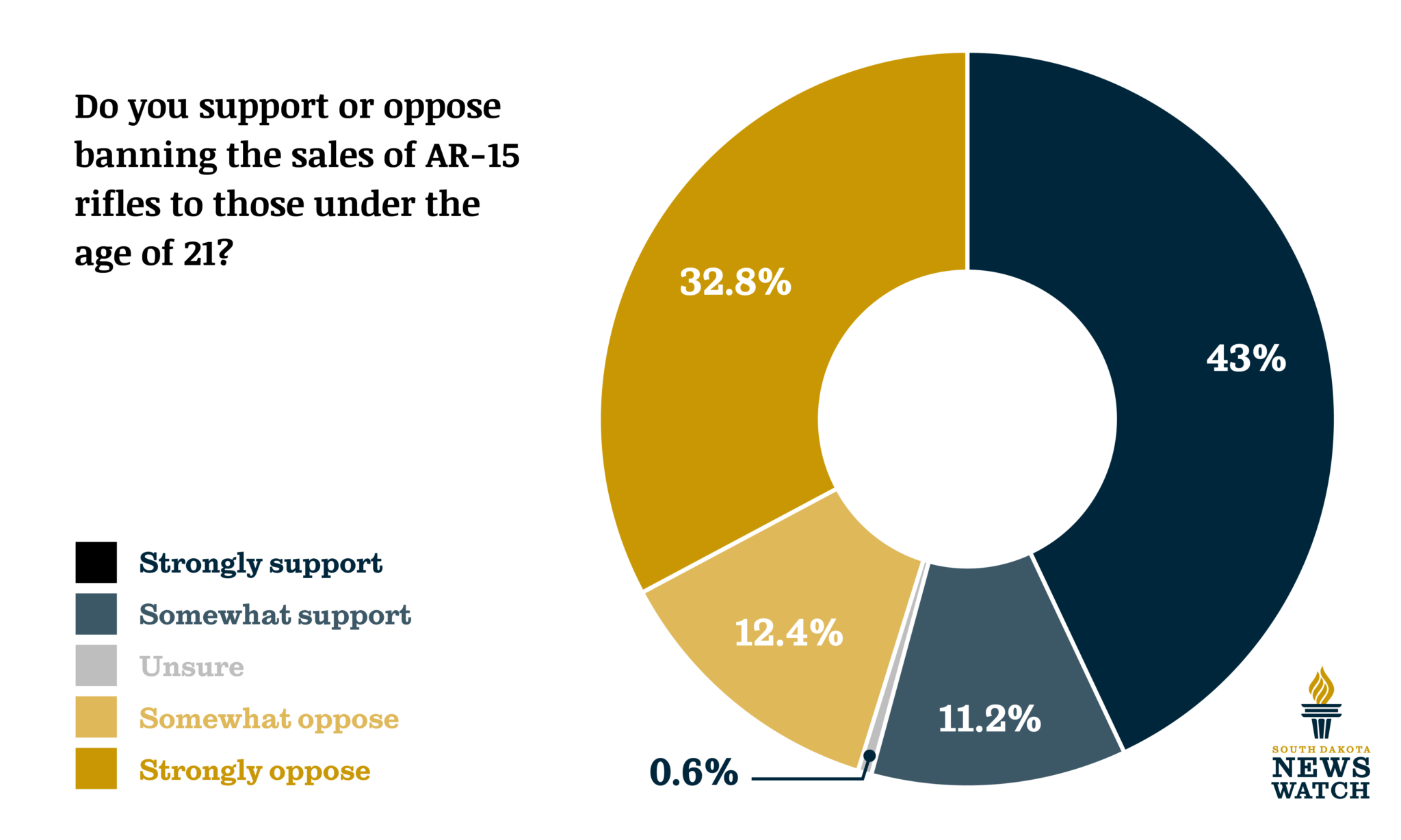
Card added that Noem’s staunch support of gun rights is “part of how she sells herself to the public,” meaning no softening of her stance should be expected as November approaches. If she wins re-election, it’s reasonable to expect that she will work with GOP legislators to make firearms even more accessible in South Dakota, regardless of public polling.
“There’s research that shows elected politicians on average are about 30 percentage points off from where the public is, meaning they’re disconnected from where voters are,” Card said. “There’s a lot of talk about what constitutes real Americans or a real majority, and polling that’s anonymous is probably more likely to get us there. But we also know that, in some cases, people may be inclined to tell pollsters what they think the pollsters want to hear. In the end, the only polls that truly matter are those that occur at the ballot box.”






